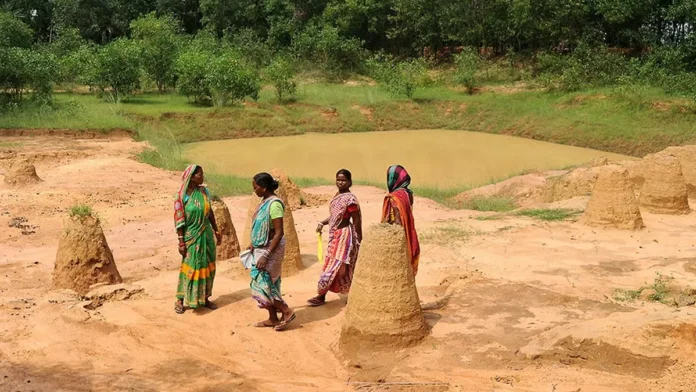India’s largest rural jobs scheme, the Mahatma Gandhi National Rural Employment Guarantee Act (MGNREGA), has been hailed as a game-changer for the country’s rural population. The scheme, which guarantees 100 days of work to every rural household, has provided a lifeline to millions of families living in poverty. However, recent reports of fake entries and administrative hurdles have raised concerns about the effectiveness of the scheme and its impact on the lives of the rural poor.
The MGNREGA was launched in 2005 with the aim of providing employment opportunities and promoting rural development. It has been successful in generating employment for millions of people and has helped in reducing poverty in rural areas. However, the recent purging of fake entries from the scheme’s database has exposed some persistent structural flaws and administrative hurdles that need to be addressed.
One of the major issues faced by the MGNREGA is the problem of fake entries. It has been reported that many people who are not eligible for the scheme have been included in the database, while those who are eligible have been left out. This has led to a situation where the benefits of the scheme are not reaching the intended beneficiaries. The purging of fake entries has revealed the extent of this problem, with thousands of entries being deleted from the database. This not only highlights the need for better monitoring and verification of beneficiaries but also raises questions about the transparency of the scheme.
Another issue that has been brought to light by the purge is the migration of families from one place to another. The MGNREGA provides employment opportunities in the rural areas, but many families have migrated to urban areas in search of better job opportunities. This has resulted in a decrease in demand for work under the scheme, leading to a decrease in the number of job cards issued. This is a major concern as the scheme is intended to provide employment to those living in rural areas, and the migration of families defeats this purpose.
The administrative hurdles faced by the MGNREGA have also been exposed by the recent purge. The scheme is plagued by delays in wage payments, lack of proper infrastructure, and inadequate staff. This has resulted in a situation where the beneficiaries are not able to access the benefits of the scheme in a timely manner. The delay in wage payments has also led to a decrease in the demand for work, as many people are not willing to wait for months to receive their wages. This has a direct impact on the livelihoods of the rural poor, who rely on the scheme for their daily wages.
The recent purge of fake entries from the MGNREGA database has highlighted the need for a comprehensive overhaul of the scheme. The government needs to address the structural flaws and administrative hurdles that have been exposed by the purge. This can be achieved by implementing a robust monitoring and verification system to ensure that the benefits of the scheme reach the intended beneficiaries. The government should also focus on creating awareness about the scheme and its benefits among the rural population. This will not only increase the demand for work under the scheme but also help in identifying the genuine beneficiaries.
The MGNREGA has the potential to bring about a positive change in the lives of the rural poor. It has already provided employment opportunities to millions of people and has helped in reducing poverty in rural areas. However, the recent purge has exposed some persistent flaws that need to be addressed to make the scheme more effective. The government must take immediate steps to address these issues and ensure that the benefits of the scheme reach the intended beneficiaries.
In conclusion, the MGNREGA has been a lifeline for millions of families living in poverty in rural India. However, the recent purge has exposed some structural flaws and administrative hurdles that need to be addressed to make the scheme more effective. The government must take proactive measures to address these issues and ensure that the scheme fulfills its intended purpose of providing employment opportunities and promoting rural development. With the right steps and proper implementation, the MGNREGA can continue to be a powerful tool in the fight against poverty in rural India.


